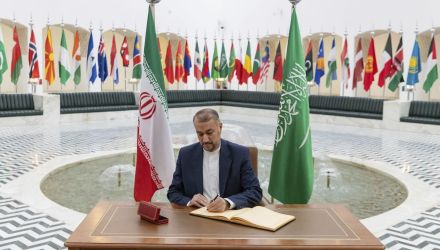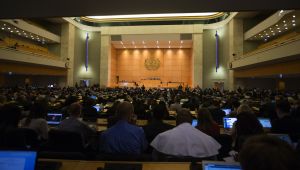In the past week, Russia celebrated the 14th anniversary of its declaration of state sovereignty, and a state funeral in Washington marked the death of Ronald Reagan, the United States' 40th president. Both events remind us how much has changed since the collapse of the Soviet Union and the end of the Cold War.
America now faces new enemies and looks to its leaders to ensure that America's principles and values will not be compromised during a time of turbulence. Russia has been transformed, both politically and economically -- but progress has been uneven. Recent trends raise troubling questions about human rights, the rule of law and the imbalance between an ever more powerful state and civil society.
Some things have not changed, however. A strong U.S.-Russian partnership is still very much in the interest of the United States. So is Russia's integration into the global economy and the establishment of an open and free society based on democratic values and the rule of law. And the American people will always remember the solidarity of the Russian people with their country after the 9/11 tragedy and Russia's immediate support for the war on terrorism.
As we look ahead, our relationship with each other must develop in a way that makes the Russian and American people safer, freer and more secure. Part of the answer to that question will certainly depend on how the United States meets the challenge of global leadership. America is strongest when its foreign policy engages its allies and reflects the clear moral leadership that helped end the Cold War. American credibility suffers when the country is not true to its principles. The easy way out is to pretend that mistakes are never made and hope that over time people at home and around the world will stop asking tough questions about how decisions were made. The refusal to level with the American people about the decision to go to war in Iraq and unwillingness to explain either to Congress or the American people how long our brave troops will stay and what the costs will be contradicts essential principles that have long guided U.S. leadership.
A central building block for a more peaceful and prosperous future is how successful the people of Russia are at building the political and economic institutions necessary to safeguard their freedom and civil liberties. There is a connection between internal values and ideals and the kind of world people want to live in -- why else would the recently concluded G8 meeting, in which President Vladimir Putin participated, spend so much time discussing a Greater Middle East Initiative to bring political reform and democratic values to that important region? There is also a direct connection between economic prosperity and the legal and political reforms that create the environment for growth.
Surely a country that wants to be in the G8 must listen when foreign leaders speak frankly about what is happening inside the country. And the weight of evidence -- from statements by concerned Russians, from reports by Western governments, organizations like the OSCE, nongovernmental organizations like Human Rights Watch, and even from the U.S. State Department -- shows that hard-won gains are being eroded and that pressure is growing on political parties, civic groups and independent media.
Russia deserves to be taken seriously by the United States, and nothing is more serious for a member of the G8 than a commitment to democratic norms. The business community might not use the same words, but investors always put a risk premium on countries where transparency and the rule of law are weak. Legal certainty is the best catalyst for prosperity.
The American people understand that Russia matters and that how the relationship between the two countries develops is important to their safety and well-being. For this reason, President George W. Bush will be asked tough questions about foreign policy in the next few months. The American people understand that personal relationships, handshakes and happy talk can only take us so far.
Americans also want to know why the Bush administration cut budget requests for money to secure Russian nuclear weapons until Congress stepped in and restored the money. They want to know why the administration sought to cut funding by 50 percent for the Freedom Support Act, which augments the efforts of Russians who support political pluralism and civil society.
Americans are united in their determination to fight terrorism and to control the spread of weapons of mass destruction. We can show the world that it is not necessary to choose between democracy and security by what they do at home and by the company they keep abroad. They need a president who can return America to the principles of engagement and leadership espoused by Harry Truman and, yes, by Ronald Reagan.
Graham Allison, Mark Brzezinski and Toby T. Gati served as officials in the Clinton administration, where they were engaged in U.S. policy towards Russia. They remain active in Democratic Party policy debates and have from time to time provided advice to the Kerry campaign. They contributed this comment to The Moscow Times.
Allison, Graham. “Questioning Bush's Foreign Policy.” Moscow Times, June 16, 2004




